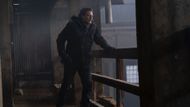The Last of Us Season 2 Episode 2 has done more than just carry forward the emotional weight of the HBO phenomenon; it’s carved its place in television history. Titled Through the Valley, the episode has now become the highest-rated in the series on IMDb, boasting a remarkable 9.5/10 from over 13,000 viewers. But this isn’t just about numbers. It’s about how a single episode can stop people in their tracks, make them feel, and leave something behind after the screen fades to black.

A story that keeps deepening
Based on the beloved video game developed by Naughty Dog, The Last of Us has always been about more than infected monsters and survival. It’s a story about connection, about two people, Joel and Ellie, whose lives are reshaped by pain, trust, and the rare, dangerous beauty of love in a broken world. Season 2 digs deeper into the emotional aftermath of their choices, with each episode revealing more cracks, more ghosts, and more truths that characters can no longer ignore.
In this particular chapter, the spotlight expands to include new faces and complicated histories. Abby, brought to life by Kaitlyn Dever, makes a striking entrance, one that fans of the game know carries weight far beyond her first few scenes. Meanwhile, Pedro Pascal delivers a performance that’s somehow both grounded and devastating, while Bella Ramsey’s portrayal of Ellie continues to unfold with quiet force, holding back just enough emotion to let it simmer beneath the surface. Every glance, every pause, carries a storm behind it.

Grief, silence, and the unbearable cost of survival
There’s a particular stillness in this episode, a kind that doesn’t come from peace, but from the heavy quiet of loss. The Last of Us doesn’t shout its grief. It sits with it. Lingers in it. It lets the pain settle into the bones of the story and the people living it. Through the Valley doesn’t need grand speeches or dramatic music swells to move you. Sometimes, it’s a single moment of hesitation, a door that won’t open, a hand that doesn’t reach out.
Director Mark Mylod knows exactly when to let silence speak louder than words. The trauma here doesn’t demand attention, it exists as an undercurrent, constant and suffocating. And that’s what makes it real. We aren’t asked to watch characters suffer. We’re asked to feel it with them, to carry some of that weight ourselves.

Are they surviving, or just learning to live with sorrow?
What this episode does so well is explore the idea that trauma isn’t something you just recover from. You live with it. You carry it, sometimes without even realizing how heavy it’s become. Ellie is now standing at the edge of a world she never asked to be responsible for, and every step forward seems to ask more of her than the last.
And then there’s Abby, not a villain, not a hero, just someone shaped by her own grief, trying to find meaning in a world that rarely offers any. There’s a quiet ache in how the episode introduces her, one that suggests her story is already heavy with loss, even before we know the details. The future, for all of them, feels uncertain, maybe even unwelcome. But the show doesn’t rush it. It lets us sit with that discomfort, and in doing so, it earns every emotional beat.

Critics, fans, and the quiet brilliance of restraint
It didn’t take long for critics and fans to rally around this episode. Beyond its record-breaking IMDb score, Through the Valley has been praised by outlets like Screen Rant, Collider, and IndieWire for its raw honesty and confident restraint. There’s no need to sensationalize what’s already devastating. Instead, the episode leans into mood, into shadow, into space.
The cinematography is intimate but unflinching. The final song, an echo of the episode’s title, lands like a soft punch to the chest. And the editing? It breathes. It lets emotions unravel instead of cutting them short. That kind of care, that patience, is rare.
Much of this success comes down to the vision of Craig Mazin and Neil Druckmann. They’ve taken source material beloved by millions and honored it not by replicating it frame for frame, but by understanding its soul. They’re not just adapting a game, they’re telling a story that refuses to let go.

More than television, this is emotional truth laid bare
The Last of Us Season 2 Episode 2 isn’t merely a great episode. It’s a reflection of what storytelling can do when it trusts its audience to feel deeply and think slowly. It asks uncomfortable questions. It doesn’t rush to answer them. It lets grief sit beside you and doesn’t apologize for it.
Some episodes leave you entertained. This one leaves you changed.
And if the rest of the season follows the path carved here, The Last of Us won’t just be remembered as a standout game adaptation. It’ll be remembered as one of those rare series that dared to look directly at pain and still find something beautiful in the wreckage.
